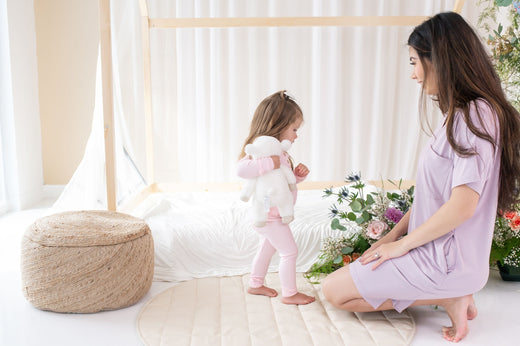When I became a parent, I knew there would be blowouts and days I’d go without taking a shower. But I did not anticipate the toll it would take on my sleep. All my friends who were parents warned, “Prepare to never sleep again,” but I didn’t believe them, or if I’m being honest, I didn’t want to believe them.
But here I am two kids later and feeling like I’m constantly playing catch up. Catching up on dishes, piles of laundry and, of course, sleep. Well, according to the National Sleep Foundation’s website, that could be just the problem — playing catch up instead of making sleep a priority, “Stop doing other things so you get the sleep you need.”
I know, I know, this sounds easier said than done, but here are some motivating reasons to put sleep at the top of your to-do list along with answers to frequently asked questions regarding your kid’s sleep. After all, both of you need it to be the healthiest and best versions of yourself.
Benefits of Sleep
There are so many ways sleep improves our daily lives. The American Academy of Pediatrics cites that adequate sleep improves attention, behavior, learning, memory, emotional regulation, quality of life, and mental and physical health not only for our kids but ourselves.
Inadequate sleep negatively affects memory recall, attention span and your and your child’s ability to focus and learn. It is also associated with an increase in injuries, hypertension, depression, especially for teens, and is directly linked to an increase in risk for obesity.
In addition to these scientifically studied benefits of sleep, simple tasks like remembering to put the keys in the diaper bag instead of the fridge seem like mere perks that come along with getting your 7–9 hours of ZZZ’s.
What is good sleep?
The World Sleep Society bases good sleep on three elements: depth, duration and continuity.
Depth is achieving the appropriate amount of time in stages 3 and 4 of sleep. In these stages, the body experiences slow-wave sleep (SWS) characterized by long delta waves in the brain, a decrease in blood pressure (so that your heart can take a break from pumping all day long), slower breathing and relaxed muscles.
In this stage, our bodies heal and restore. The growth hormone is released, our cells repair damage and our immune system recharges.
For adults, we need to spend 20%, or 1.5–2 hours, of our total sleep in this stage. If you’ve ever woken up feeling extremely groggy and heavy, it is because you were awoken during this phase and your deep sleep was disrupted. Children and babies spend less time in this stage compared to REM (where they spend 50% of their sleep), but it is still a crucial part of their sleep cycle, especially in terms of growth and immunity, which is why pediatricians say sleep is the best medicine.
Duration is how much sleep you are getting each night. The National Sleep Foundation advises that each age group get the following hours of sleep within 24 hours:
- Adults: 7–9
- Toddlers: 11–14
- Babies 4–11 months: 12–15
- Infants 0–3 months: 14–17
Now although, you may be getting eight hours of sleep at night, it doesn’t count if it is fragmented. That is where continuity steps in.
Continuity is getting peaceful, unawakened sleep. For example, if you get seven hours of sleep over the span of eight hours then it means you are waking and falling back to sleep several times within eight hours just to get seven hours of sleep. This diminishes the quality of your sleep and your body’s ability to restore and recharge.
For parents, continuity seems unattainable, especially if you have a young baby who wakes for nighttime feedings and diaper changes. Fortunately, an article by Harvard Women’s Health Watch says sleep debt can be “repaid” by taking an hour-long nap in the afternoon when your circadian rhythm naturally signals the body that it is sleepy again. Turns out, your mom was right about sleeping when the baby sleeps.
Another way to attain continuity of sleep is to decrease night feedings and eventually wean baby altogether. See the FAQs below for more detailed information.
How do I achieve good sleep for myself and my children?
Routine, routine, routine. Sticking to a bedtime ritual for both yourself and your little ones is key to getting the most effective sleep possible. Here are some ways to establish a simple yet slumber-worthy routine.
For babies and toddlers:
The main idea is to establish a series of steps that signals to your baby that sleepy time is on its way. Give your baby a warm bath, or if you prefer not to bathe daily, perform another hygiene ritual like gently cleaning her gums with a damp washcloth or brushing her hair with our Cradle Cap Brush made with supersoft goat-hair bristles.
Make sure the setting is right — dim lights, play soft music or white noise and use quiet voices. There should be no light emitted from TVs, tablets, phones or other electrical devices as these can interrupt the release of melatonin, the sleepy hormone.
Next, dress baby for the night. Whether you wrap baby in a swaddle or a sleep sack, either are strong indications to your child that it is time to sleep. Most parents who use our bamboo sleep bags say that as soon their child sees it, they settle down — whether that is getting comfortable with the idea of laying down or even asking to go to bed, presenting the sleep bag is an effective way to get baby to sleep.
Nurse your baby but try not to nurse baby to sleep. When we nurse or feed baby to sleep, he becomes conditioned to needing that same soothing comfort every time he awakes. This can lead to several night awakenings that can only be soothed if you nurse or bottle feed back to sleep. Try to nurse until baby is very drowsy but not fully asleep, then unlatch and lay baby down. You may have to rock baby, provide white noise or a combination of both, but ultimately it is better to soothe them this way than with food. And by letting your baby fall asleep on his own rather than through nursing, you increase your chances of getting continual sleep since you won’t have to wake up to nurse multiple times a night.
Try your very best to put baby down at the same time every night. A good rule of thumb is to put baby to bed when the sun goes down and wake when the sun comes up, usually around 7pm–7am.
And lastly, understand your baby’s sleep patterns. Babies generally sleep in three stages according to an evidence-based article by Parenting Science:
- Active Sleep or REM
- Transitional Sleep
- Quiet Sleep
Babies spend nearly half of all their sleep in active sleep. In this phase, their brain compartmentalizes information and lays down memories. It’s deemed “active” because, well, baby is active and could be awakened easily. Have you ever watched a sleeping baby smile or frown, even vocalize in his sleep? That’s because he is experiencing the baby version of REM, or dreamlike sleep. Unlike an adult’s REM cycle, baby’s muscle tone is strong, their limbs may twitch or even thrash. In contrast, we as adults enter a sleep paralysis during REM so as not to act out our dreams.
Transitional sleep is a light sleep where the baby transitions from active to quiet sleep. In this stage, babies may appear to be awake. They might open their eyes or even suck their lips, which can signal to mom or dad that they are awake and hungry. It’s important to pay attention to their cues during this stage and allow them the opportunity to soothe themselves back to sleep. Arousing them prematurely will disrupt their sleep cycle and make it harder for both you and baby to achieve quality sleep. So when in doubt, wait it out — wait for baby to communicate that she is hungry or needs a diaper change; otherwise, let her continue sleeping. After all, it is normal for baby to awaken briefly every hour.
Lastly, quiet sleep is just as it sounds … quiet. Baby shows more of the typical sleeping behaviors like deep, regular breaths and little to no movement. In this stage, they experience the same slow-wave sleep that we do as adults, so it is important to let them slumber uninterrupted so their bodies can develop optimally.
Did you know:
The natural tendency for babies to awaken during active sleep, or light REM, is actually considered a defense mechanism to SIDS. Since they spend half of their sleep in this phase, they have the ability to awaken easily if, for any reason, they are not getting enough oxygen.
And for you
Do much of the same thing. First, pencil it in. Try your best to start your bedtime routine at the same time every day, even on the weekends. Some scientists say that regularity in addition to depth, duration and continuity is another factor in avoiding sleep debt.
Take a shower or a bath, dim the lights, read a book — whatever it is, make sure it is relaxing and not too stimulating, like watching a movie or playing video games. In fact, turn off all screens and allow your body to naturally release the sleepy hormone, melatonin.
Now that you are a parent or on the verge of parenthood, sleep may seem like a luxury, but it’s important that we make it a priority just as we do eating and drinking. Think of it this way, sleep is so important that our body will naturally succumb to it if we deprive it for too long. For both adults and children, sleep reduces the amount of cortisol, the stress hormone, in our system, properly regulates our insulin levels and blood pressure contributing to a lower risk of diabetes and hypertension. It also keeps our immune system on the up and up so that we can develop the antibodies we need to fight viruses. It helps us remember things better and learn new tasks, which is especially important for kids who acquire new skills every day.
FAQ
Below are questions posed by moms in our Facebook group Kyte KLUB with answers from our friend Alicia Birdsong. She is a certified child sleep consultant, mother of two, mental health counselor and owner of Hush Little Birdie pediatric sleep consulting.
Disclaimer: There are many factors that impact a baby’s and child’s sleep, so, without a detailed sleep history of a child, these answers are more general and not tailored to each individual. For more guidance, DM Alicia for a free 15-minute consultation.
What if you have a great napper but a terrible night sleeper?
Two things can be impacting this.
- The sleep schedule may not be age appropriate. The quality of daytime sleep impacts nighttime sleep, and vice versa. If a baby's daytime sleep schedule is not meeting their sleep needs for their age, they are going to go into nighttime sleep overtired, which sets the stage for night wakings.
- When a baby doesn't have the skill of falling asleep independently, they are not able to connect their sleep cycles on their own, which can also impact nighttime sleep.
How can I sleep train a baby who bed shares and get her to sleep in her room?
You would choose a sleep training approach and start implementing it when you transition your little one to her own room. The sleep training method I would recommend would be based on the age of the child and if the child is still in a crib or not. The sleep training method also depends on what parents are comfortable with. Some want to be in the room with their child through the whole process, others prefer to give their child some space and come in to check on them. These are things that I discuss with families in detail when I put together a personalized sleep plan for their child. One key factor in being successful with any sleep training method is being 100% consistent. If you aren't consistent it's confusing for your little one, and it won't set them up to be successful.
Tips for brothers sharing a room?
The best scenario for this would be that your youngest is sleeping well before you transition to room sharing, so he doesn't wake your oldest up. If your youngest is still waking at night, and /or having a hard time falling asleep for the night, I would recommend sleep training prior to having the boys room share. This way your youngest will have learned the skill of falling asleep independently in advance which will set the stage for both boys to sleep well.
For your oldest, you can prep him for the transition, and talk about it in an exciting way. For example you could say "your little brother gets to share a room with you soon, how fun will that be! you can be sleeping buddies!"
Lastly, I would keep your oldest in the crib as long as possible, so that way he doesn't get out of bed and disrupt his brother.
When to transition a toddler out of crib?
I suggest waiting until 3–4 years of age before you transition your little one from their crib to a big kid bed. It's not until that age that little ones have the developmental capability to understand they need to stay in their bed.
How to night wean a one year old?
You can do this one of two ways.
- Start gradually reducing the amount of time you feed your little one for night feeds. For example, if they feed for 10 minutes, feed them for 8 minutes, the next night feed them for 7 minutes, etc.
- You can choose to eliminate night feeds "cold turkey" if this is the route you choose, you would benefit from choosing a sleep training method so you have a plan on how to handle the night wakings.
She’s a independent sleeper (her own crib/room, falls asleep on her own). I cap her nap to 2 hours during the day where she doesn’t sleep too much during the day. She’s been waking super early too! Wondering if it’s the 2 year sleep regression early and I should just ride it out or try to adjust her schedule 🤔
There is an 18/19 month sleep regression so this could be part of your little one’s struggle. For 19 months of age, I suggest having your little one asleep for the night 4 hours after their nap ends. For example, if they sleep until 2:30pm, aim for them to be asleep for the night by 6:30pm. Some little ones at this age can tolerate closer to 4.5 hours of wake time vs. 4, having said that, the early morning wake ups your little one is experiencing leads me to think she's overtired, so I would opt for the 4 hours of wake time.
My son is 6 months old and is at a phase where he wakes up every 2–3 hours to eat. How do I wean him away from night feedings?You can do a couple things here, depending on what your comfortable with. 1) You could decide to sleep train, and address the night feedings that way. With sleep training you can still keep 1–2 night feeds in place, but the key would be to not allow your little one to fall asleep while feeding at night, and place them back in their crib awake. 2) If you don't want to sleep train, I would get your significant other on board and have them help tackle night wakings. For example, if your little one is waking 2 hours after they last fed, have your significant other be the one to go in and assist back to sleep.
Is there such thing as too much sleep for a 9 month old? He’s VERY active during awake times. I usually wake him up in the morning after 12–13 hours and he usually takes 2–3 naps totaling about 3/3.5 hours.
The National Sleep Foundation recommends between 12–15 hours of sleep for babies 4–11 months of age in a 24 hour period. Having said that, they do state that 16–18 hours may be appropriate. Your little one is falling in that range, so I wouldn't worry :) I don’t need it yet but is there a way to night wean without fully weaning? After my middle turned two I decided to night wean when I had my parents in town to help. It worked but he ended up fully weaning. My youngest is only 7mo and very low weight (2nd percentile) so I’m super ok doing night feeds right now but I don’t really want to wait as long to night wean but I don’t want him to daytime wean before 2.
This is a tricky one, because it really is based on each child's preference. What I can tell you is that I work with many families in which mom is still nursing, we night wean, and baby still continues to nurse during the day. This is almost always the case. Having said that, if you wait to night wean until let's say 1–1.5 years of age, given where your little one is at developmentally they may selectively decide to wean themselves during the day. If that happens, you could continue to pump, and then offer breast milk in a sippy cup or bottle.
By: Jessica Murrugarra














1 comment
Brittany Swanson
Great read! Thank you for caring about safe sleep!
Great read! Thank you for caring about safe sleep!